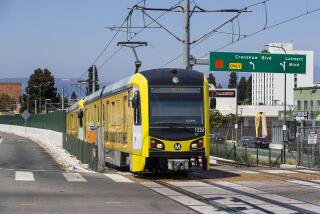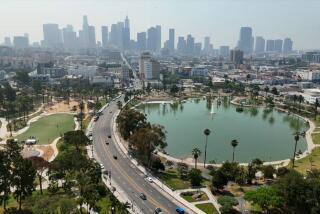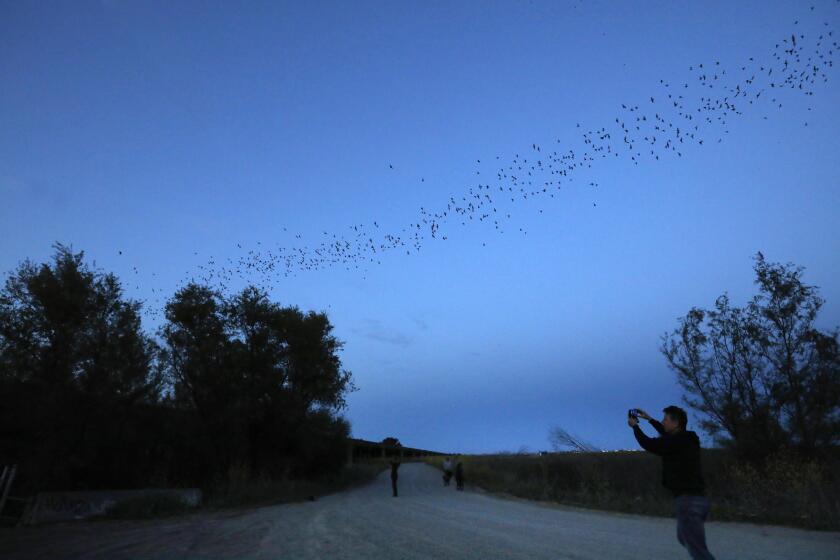City Compromises on Street Improvements
After more than a year of dispute, a compromise has been reached on some portions of a $14-million project to ease traffic on Glendale Boulevard, a major thoroughfare into downtown Los Angeles.
Some residents in Echo Park objected to the proposed permanent closing of Berkeley Avenue at Glendale and street widening at Glendale and Temple Street, which would endanger some popular tennis courts on the northeastern corner of the intersection.
Now, thanks to suggestions by Los Angeles traffic engineers, compromises have been reached with residents to move the project along. The City Council has approved the amended plans.
“We’re happy with this,” said Judy Raskin, an Echo Park resident who served on a citizens panel that has studied Glendale’s traffic problems for nearly a decade.
For years, city officials and area residents have been grappling with how best to deal with rush-hour traffic that routinely clogs a two-mile stretch of Glendale; an estimated 30,000 commuters use the boulevard to and from Los Angeles daily. The Glendale Freeway empties directly onto the boulevard two miles north of downtown, further compounding traffic.
Traffic also backs up on Alvarado Street, which feeds into Glendale at the intersection with Berkeley in Echo Park.
On June 15 of last year, Eric Garcetti’s first day as the newly elected councilman for parts of Echo Park, the council was scheduled to approve the Glendale corridor plan. But protests over the proposed closure of Berkeley and the widening at Glendale and Temple prompted Garcetti to seek a delay. He asked residents and city traffic engineers to discuss remedies.
“After a lot of prodding from us, the Department of Transportation started to think outside of the box with the problems that we had,” Raskin said.
The result of the yearlong talks were solutions that quickly gained community support:
* Berkeley will be kept open at Glendale, allowing access to neighborhoods adjoining the street.
* Southbound left turns from Glendale onto Berkeley will be prohibited on most days, eliminating a cycle of lights at the intersection.
* Northbound traffic from Glendale, at the intersection with Berkeley and Alvarado, can proceed through on Alvarado, which trails into a hilly neighborhood on the east side of Glendale. But return traffic on Alvarado can no longer enter the intersection, thus doing away with another cycle of signals there. Traffic will be rerouted to Berkeley to proceed south on either Glendale or Alvarado.
* A traffic signal will be installed at Glendale and Aaron Street, just north of the Glendale-Alvarado-Berkeley intersection, to slow the traffic flow in the area.
To discourage commuters from cutting through residential streets to get to Glendale, an eastbound left-turn light will be installed on Sunset at Alvarado.
These and previously approved measures should help ease congestion on Glendale, Garcetti said.
“I’m ecstatic not just because of the process but [because] of the solutions reached,” he said.
Farhad Zaltash, the city’s project manager, added: “It was very frustrating, but we learned a lot. Eventually, we came up with a solution that the community likes and one that we can live with.”
Meanwhile, talks are continuing between Echo Park residents and planners at Caltrans and the Metropolitan Transportation Authority over a project to restructure the Glendale Freeway’s terminus at Glendale Boulevard.
Residents hope state transportation officials will agree to remake the terminus to create about five acres of park land near the Tommy Lasorda baseball field, which is just west of the freeway’s end.
Landscaping, more traffic signals and other improvements also are being studied to ease traffic along that segment of Glendale Boulevard.
More to Read
Sign up for Essential California
The most important California stories and recommendations in your inbox every morning.
You may occasionally receive promotional content from the Los Angeles Times.










![[20060326 (LA/A20) -- STATING THE CASE: Marchers organized by unions, religious organizations and immigrants rights groups carry signs and chant in downtown L.A. "People are really upset that all the work they do, everything that they give to this nation, is ignored," said Angelica Salas of the Coalition of Humane Immigrant Rights. -- PHOTOGRAPHER: Photographs by Gina Ferazzi The Los Angeles Times] *** [Ferazzi, Gina -- - 109170.ME.0325.rights.12.GMF- Gina Ferazzi/Los Angeles Times - Thousands of protesters march to city hall in downtown Los Angeles Saturday, March 25, 2006. They are protesting against House-passed HR 4437, an anti-immigration bill that opponents say will criminalize millions of immigrant families and anyone who comes into contact with them.]](https://ca-times.brightspotcdn.com/dims4/default/34f403d/2147483647/strip/true/crop/1983x1322+109+0/resize/840x560!/quality/75/?url=https%3A%2F%2Fcalifornia-times-brightspot.s3.amazonaws.com%2Fzbk%2Fdamlat_images%2FLA%2FLA_PHOTO_ARCHIVE%2FSDOCS%2854%29%2Fkx3lslnc.JPG)